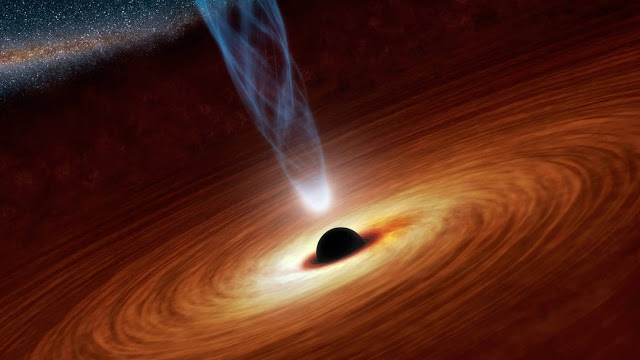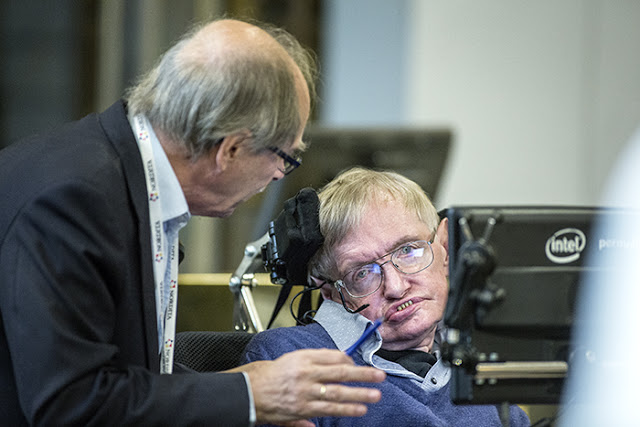| Online: | |
| Visits: | |
| Stories: |

| Story Views | |
| Now: | |
| Last Hour: | |
| Last 24 Hours: | |
| Total: | |
Black Holes Store, And Garble, Information: Stephen Hawking Offers New Solution To Black Hole Mystery
One of the most baffling questions facing a generation of physicists is what happens to the information about the physical state of things that are swallowed up by black holes? Is it destroyed, as our understanding of general relativity would predict? If so, that would violate the laws of quantum mechanics.
This artist’s concept illustrates a supermassive black hole with millions to billions times the mass of our sun. Supermassive black holes are enormously dense objects buried at the hearts of galaxies.
Image credit: NASA/JPL-Caltech
Today at the Hawking Radiation conference, Hawking presented his latest idea about how this paradox can be solved — that is, how information is preserved even if it’s sucked into a black hole.
Nobel physics laureate Gerard ‘t Hooft, of Utrecht University, the Netherlands, confers with Stephen Hawking after the Cambridge professor presented his solution to the information loss paradox. Hawking is in town for a weeklong conference on the information loss paradox, which is co-hosted by Nordita at KTH Royal Institute of Technology.
Hawking is in town for the weeklong conference, which is co-sponsored by Nordita, UNC and the Julian Schwinger Foundation. Nordita is co-hosted by KTH and Stockholm University. UNC Physicist Laura Mersini-Houghton was instrumental in assembling 32 of the world’s leading physicists to tackle the problem, which stems from contradications between quantum mechanics and general relativity.
Everything in our world is encoded with quantum mechanical information; and according to the laws of quantum mechanics, this information should never entirely disappear, no matter what happens to it. Not even if it gets sucked into a black hole.
But Hawking’s new idea is that the information doesn’t make it inside the black hole at all. Instead, it’s permanently encoded in a 2D hologram at the surface of the black hole’s event horizon, or the field surrounding each black hole which represents its point of no return.
As we understand them, black holes are regions of space-time where stars, having exhausted their fuel, collapse under their own gravity, creating a bottomless pit that swallows anything approaching too closely. Not even light can escape them, since their gravitational pull is so infinitely powerful.
“The information is not stored in the interior of the black hole as one might expect, but in its boundary — the event horizon,” he said. Working with Cambridge Professor Malcolm Perry (who spoke afterward) and Harvard Professor Andrew Stromberg, Hawking formulated the idea that information is stored in the form of what are known as super translations.
Conference participants wait while Stephen Hawking composes an answer to a question.

Photo, Håkan Lindgren
“The idea is the super translations are a hologram of the ingoing particles,” Hawking said. “Thus they contain all the information that would otherwise be lost.”
This information is emitted in the quantum fluctuations that black holes produce, albeit in “chaotic, useless form,” Hawking said. “For all practical purposes the information is lost.”
But in his lecture in Stockholm the previous night, Hawking also offered compelling thoughts about where things that fall into a black hole could eventually wind up.
“The existence of alternative histories with black holes suggests this might be possible,” Hawking said. “The hole would need to be large and if it was rotating it might have a passage to another universe. But you couldn’t come back to our universe.
“So although I’m keen on space flight, I’m not going to try that.”
Contacts and sources:
David Callahan
KTH Royal Institute of Technology
Source:





